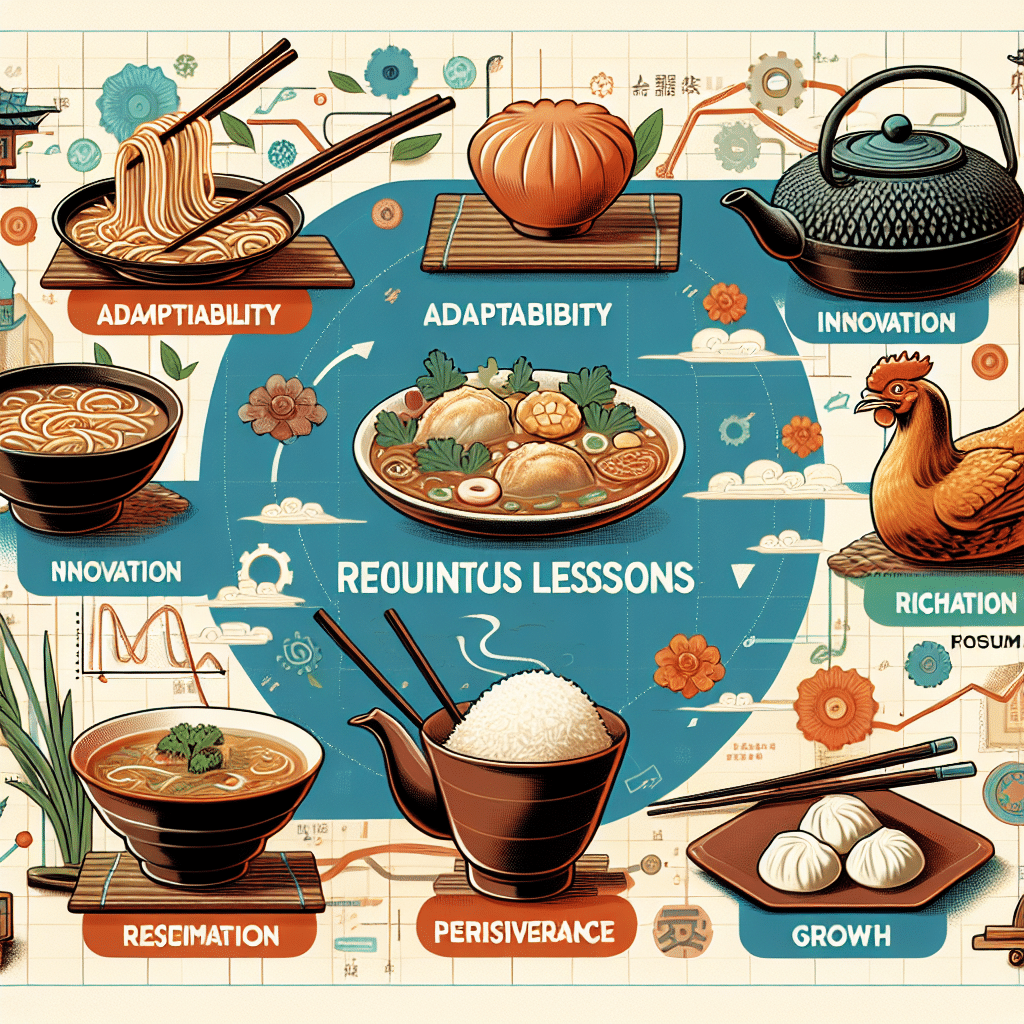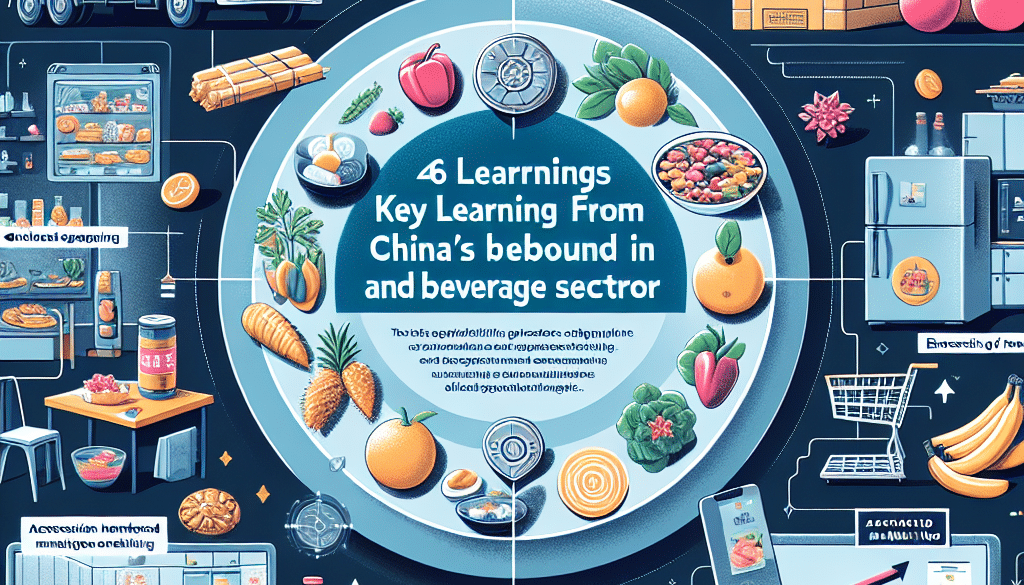China’s Recovery Lessons: 6 Food and Beverage Industry Takeaways
-
Table of Contents
- China’s Recovery Lessons: Food and Beverage Industry Insights
- 1. Embracing Digital Transformation
- 2. Prioritizing Health and Safety
- 3. Adapting to New Consumer Behaviors
- 4. Leveraging Local Supply Chains
- 5. Innovating with Agility
- 6. Building Brand Resilience
- Conclusion
- ETprotein: Your Partner for High-Quality Protein Products
China’s Recovery Lessons: Food and Beverage Industry Insights

The COVID-19 pandemic has been a significant disruptor for industries worldwide, and the food and beverage sector is no exception. As one of the first countries to face the pandemic and subsequently begin its recovery, China’s food and beverage industry has provided valuable lessons for businesses globally. This article delves into six key takeaways from China’s recovery, offering insights that can help industry players navigate the post-pandemic landscape.
1. Embracing Digital Transformation
One of the most significant shifts observed in China’s food and beverage industry is the accelerated adoption of digital technologies. With lockdowns and social distancing measures in place, businesses had to pivot quickly to online platforms to maintain their customer base.
- Online Ordering and Delivery: Restaurants and food retailers expanded their online ordering systems and partnered with delivery services to reach consumers at home.
- Virtual Experiences: Brands offered virtual cooking classes and tasting sessions to engage customers and create a sense of community.
- Supply Chain Digitization: Companies invested in digital tools to enhance supply chain resilience, allowing for real-time tracking and better inventory management.
Case studies, such as that of the Haidilao hotpot chain, illustrate the success of integrating smart technology in kitchens and enhancing customer experiences through digital platforms.
2. Prioritizing Health and Safety
Consumer concerns about health and safety have risen to the forefront. The food and beverage industry in China responded by:
- Implementing Strict Hygiene Protocols: Businesses adopted enhanced cleaning procedures and transparent safety measures to reassure customers.
- Health-Conscious Products: There was a surge in demand for products with immune-boosting and health-promoting benefits.
- Transparent Communication: Brands communicated their safety efforts openly to build trust with consumers.
Statistics show that brands that highlighted their health and safety efforts saw a positive impact on consumer perception and sales.
3. Adapting to New Consumer Behaviors
The pandemic has altered consumer behaviors, with a shift towards home cooking and healthy eating. Food and beverage companies in China have adapted by:
- Offering Ready-to-Cook and Meal Kits: These products cater to the demand for convenient, home-cooked meals.
- Focusing on Health and Wellness: There’s been an increase in the production of functional foods and beverages that support well-being.
- Adjusting Product Portfolios: Companies have reevaluated their product lines to align with the new consumer priorities.
Brands like Genki Forest have thrived by offering low-calorie, healthier beverage options that resonate with health-conscious consumers.
4. Leveraging Local Supply Chains
Disruptions in global supply chains prompted a reevaluation of sourcing strategies. Chinese companies have learned to:
- Strengthen Local Partnerships: Collaborating with local suppliers to reduce dependency on international sources.
- Invest in Domestic Production: Increasing investment in local manufacturing capabilities to ensure supply chain continuity.
- Diversify Supply Sources: Avoiding over-reliance on a single supplier or region to mitigate risks.
Local sourcing not only supports resilience but also appeals to consumers’ growing preference for locally produced goods.
5. Innovating with Agility
Innovation has been crucial for survival and growth during the recovery phase. Chinese food and beverage companies have demonstrated:
- Rapid Product Development: Quickly bringing new products to market in response to changing consumer needs.
- Flexible Business Models: Adapting business operations to accommodate new market realities, such as the rise of ghost kitchens.
- Investment in R&D: Committing resources to research and development to stay ahead of industry trends.
Examples include the rise of plant-based meat alternatives, which have seen significant growth in China as companies innovate to meet dietary trends.
6. Building Brand Resilience
Building a resilient brand that can withstand crises has been another lesson from China’s recovery. Key strategies include:
- Engaging with Customers: Maintaining open lines of communication and building relationships with consumers through social media and other channels.
- Corporate Social Responsibility (CSR): Companies that actively contributed to pandemic relief efforts have seen a boost in brand loyalty.
- Flexibility in Marketing: Adapting marketing strategies to the changing environment and consumer sentiment.
Brands like Tsingtao Brewery have enhanced their brand resilience by supporting communities and adapting their marketing campaigns to the mood of the nation.
Conclusion
China’s food and beverage industry has navigated the pandemic with strategic shifts that offer valuable lessons for businesses worldwide. Embracing digital transformation, prioritizing health and safety, adapting to new consumer behaviors, leveraging local supply chains, innovating with agility, and building brand resilience are the six key takeaways from China’s recovery. By learning from these strategies, companies can better prepare for future challenges and opportunities.
ETprotein: Your Partner for High-Quality Protein Products
In light of the growing demand for health-conscious food and beverage options, ETprotein’s range of organic bulk vegan proteins and L-(+)-Ergothioneine (EGT) products are perfectly positioned to meet the needs of manufacturers looking to innovate and expand their offerings. With a commitment to non-GMO, allergen-free ingredients, and high purity levels, ETprotein supports the industry’s move towards healthier, sustainable, and consumer-preferred products.
Whether you’re developing new health-focused beverages, sports nutrition, or dietary supplements, ETprotein’s expertise and extensive product range can help you achieve your goals. Contact them to explore how their protein solutions can enhance your product line and cater to the evolving preferences of health-conscious consumers.
About ETprotein:
ETprotein, a reputable protein and L-(+)-Ergothioneine (EGT) Chinese factory manufacturer and supplier, is renowned for producing, stocking, exporting, and delivering the highest quality organic bulk vegan proteins and L-(+)-Ergothioneine. They include Organic rice protein, clear rice protein, pea protein, clear pea protein, watermelon seed protein, pumpkin seed protein, sunflower seed protein, mung bean protein, peanut protein, and L-(+)-Ergothioneine EGT Pharmaceutical grade, L-(+)-Ergothioneine EGT food grade, L-(+)-Ergothioneine EGT cosmetic grade, L-(+)-Ergothioneine EGT reference grade and L-(+)-Ergothioneine EGT standard. Their offerings, characterized by a neutral taste, non-GMO, allergen-free attributes, with L-(+)-Ergothioneine purity over 98%, 99%, cater to a diverse range of industries. They serve nutraceutical, pharmaceutical, cosmeceutical, veterinary, as well as food and beverage finished product distributors, traders, and manufacturers across Europe, USA, Canada, Australia, Thailand, Japan, Korea, Brazil, and Chile, among others.
ETprotein specialization includes exporting and delivering tailor-made protein powder and finished nutritional supplements. Their extensive product range covers sectors like Food and Beverage, Sports Nutrition, Weight Management, Dietary Supplements, Health and Wellness Products, and Infant Formula, ensuring comprehensive solutions to meet all your protein needs.
As a trusted company by leading global food and beverage brands and Fortune 500 companies, ETprotein reinforces China’s reputation in the global arena. For more information or to sample their products, please contact them and email sales(at)ETprotein.com today.












